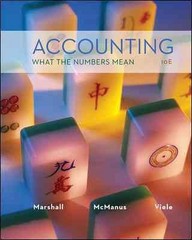Intermediate Financial Reporting
1. Which of the following entities is least likely to be a major player in developing financial reporting standards in Canada? a. International Accounting Standards Board b. (Canadian) Accounting Standards Board C. The Federal government d. Financial Accounting Standards Board 2 . Financial statements are prepared for the user. Which of the following best describes the responsibility for the preparation of financial statements? a. They are the responsibility of management. b. They are the responsibility of external auditors. C. They are the responsibility of shareholders. d. They are the responsibility of standard setters. 3. Which of the following is not an objective of financial reporting? to provide information about an entity's economic resources, obligations, and equityet assets b. to provide information that is helpful to investors and creditors and other users in making resource allocation decisions and/or assessing management stewardship C. to provide information that is useful in assessing the economic performance of the entity d. to promote information asymmetry 4. A local businessman owns several different companies. His accountant prepares separate annual financial statements for each of these businesses. This is an application of which of the following principle or assumption? a. full disclosure b. periodicity C. economic entity d. matching 5 . When knowledgeable, independent users achieve similar results or reach consensus regarding the accounting for a particular transaction, which enhancing qualitative characteristic is said to exist? a. comparability b. verifiability L C. relevance d. understandability 6. A trial balance a. is a list of general ledger account names. b. proves that all transactions have been recorded. C. can be used for the preparation of financial statements. d. can never be used for the preparation of financial statements. 7. Which of the following is correct regarding income statement presentation? a. Income from continuing operations is the last line shown on the income statement. b. IFRS does not allow the use of a single-step income statement. C. Unusual gains or losses must be presented in a separate section after income from continuing operations. d. IFRS requires that both basic and diluted earnings per share be presented, whereas ASPE does not. 8. IFRS requires that expenses are presented in the income statement a. by nature or by function. b. by amount or in alphabetical order. C. by geographical area or by the single-step method. d. by current or non-current. 9 . Which of the following should not be considered as a current asset on the statement of financial position? a. instalment notes receivable due over 18 months in accordance with normal trade practice b. prepaid taxes that cover assessments of the following operating cycle of the business C. equity or debt securities held to finance future construction of additional facilities d. spare parts and supplies inventories 10. The discrete earnings process is one that a. takes place over several accounting periods. b. has a critical event. where substantial completion can be deferred. d. must be accounted for by the completed-contract method







